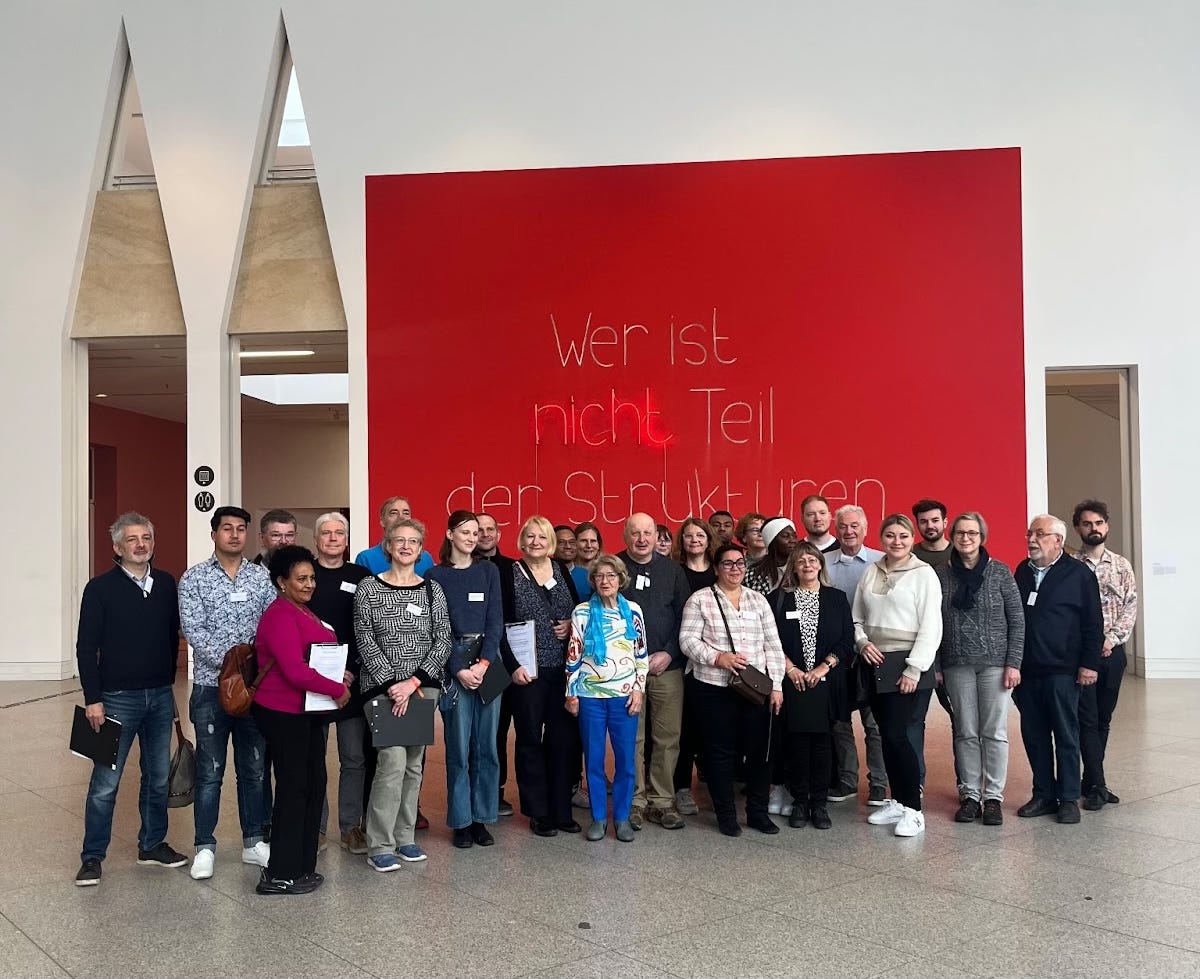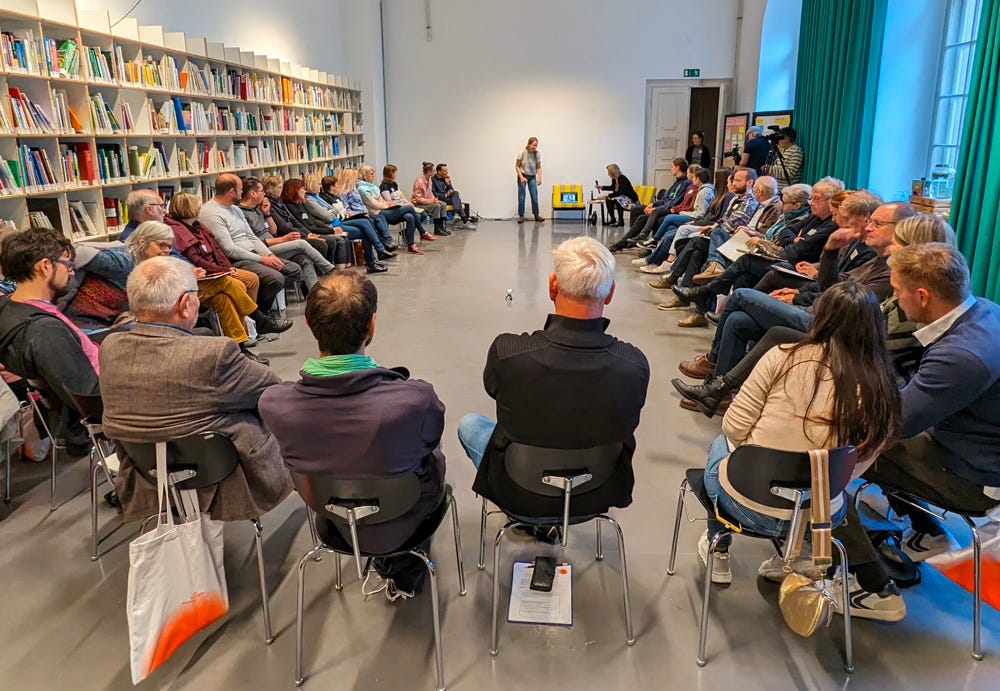Democracy... in German museums! 🇩🇪
How museums in Bonn and Dresden are using Citizen Assemblies' to shape their future

Museums are a treasure for democracy. They are public places where we can come together in empathy and connect across our beliefs as art helps us to experience the world from others’ point of view. They make our hearts and minds more capacious, taking in the complexity of realities in society. They are also places where we can critically reflect about our shared past, present, and future, and thoughtfully open up spaces for difficult conversations. Crucially, museums help us open up our imaginations, get inspired, and explore ideas for our individual and shared futures.
As we face societal polarisation, find it hard to imagine hopeful futures, and have few opportunities for informed and meaningful exchange about our collective existence, museums help us address these challenges. It’s not merely a feeling. A recent European Commission study shows that going to museums and participating in cultural activities strengthens democracy and social cohesion. It does so independently of a person’s socio-economic background or education level.
It is vital that museums are open, welcoming, and inclusive. But does everyone feel welcome in a museum? How can a museum become an inviting place for all people? How can it remain relevant and enable social dialogue on the most pressing issues of these rapidly changing times? In Europe, people with higher education and above-average incomes who live in cities are twice as likely to engage in cultural activities as other groups.
DemocracyNext, Design & Democracy (Amelie Klein and Vera Sacchetti), and nexus have been collaborating on groundbreaking Citizens’ Assemblies to democratise museums with two major German cultural institutions - Bundeskunsthalle (Art and Exhibition Hall of the Federal Republic of Germany) in Bonn and the Kunstgewerbemuseum, Staatliche Kunstsammlungen Dresden (SKD, Museum of Decorative Arts and Design). Each museum posed these questions to everyday people selected by sortition (lottery) over the course of two Citizens' Assemblies that wrapped up this November 2023.

Each Assembly was composed of 35 people broadly representative of the Bonn and Dresden communities and met for four days of informed deliberation over the course of two weekends. In addition to capturing the diversity of Bonn and Dresden in terms of age, gender, location, and socio-economic background, many people selected don’t often visit museums. They were able to share valuable insights that would be exceptionally difficult to capture otherwise.
These Citizens’ Assemblies have developed a comprehensive list of recommendations: from dedicated exhibitions for children, inclusivity trainings for museum staff, more seating in exhibition halls, simpler jargon-free language describing exhibitions, interactive exhibitions that engage visitors’ minds and bodies, co-creation processes where pieces are created together with other visitors and museum team members, to the opportunity to vote for what kinds of exhibitions people would like to see in Dresden, to a permanent Citizens’ Assembly to advise the Bundeskunsthalle on strategic decisions more systematically, and others. Two reports with the detailed lists of recommendations to each museum will be available in January 2024 (Bonn) and May 2024 (Dresden).
These recommendations have been welcomed by museum directors and will help guide their transformation to become more open and inclusive for all.
Eva Kraus, Director of the Bundeskhunstalle, commented on why she wanted to initiate a Citizens’ Assembly on democratising the museum: "We want the Bundeskunsthalle to become a more welcoming, inclusive, and diverse place, and are seeking to enable social dialogue on relevant issues, especially within these changing times. We have invited the citizens of Bonn - our neighbours - and engaged in a very fruitful process together. It has offered a great experience for all of us and we are very grateful to be able to learn from each other."
After having observed the Citizens’ Assembly in Dresden, Thomas A. Geisler, Director of the Kunstgewerbemuseum, said: “Lately a lot has been debated in theory about the democratisation of museums as systems. Experiencing a Citizen‘s Assembly in real-time opens up ways forward for the institution, as well as the Assembly Members, who experienced the museum as a place of self-empowerment.”
The Assemblies will be featured at and followed by the exhibition “All In! Redesigning Democracy.” Curated by Johanna Adam (Bundeskunsthalle), Amelie Klein and Vera Sacchetti, the exhibition focuses on the history and future of democracy and will be presented in both museums in Bonn and Dresden. The exhibition will open in May 2024 at the Bundeskunsthalle in Bonn and in spring 2025 at the Kunstgewerbemuseum, Staatliche Kunstsammlungen Dresden (SKD, Museum of Decorative Arts and Design), showcasing historical artefacts such as ballots, posters, parliamentary architecture, as well as exploring how the current democratic paradigm is changing.
“By learning what people really think about culture and the arts from Citizens’ Assemblies, cultural institutions like the Bundeskunsthalle in Bonn and SKD in Dresden have an opportunity to reinvent themselves for the 21st century as genuinely democratic and inclusive spaces,” said Alice Rawsthorn, award-winning design critic, DemocracyNext board member and author of Design as an Attitude.
These Assemblies were able to demonstrate that citizen deliberation can fit seamlessly in cultural institutions and they represent an exciting new avenue for museums, theatres, libraries, concert halls to directly and constructively involve the public they serve in taking decisions that shape the future of these institutions. —Ieva Česnulaitytė
🔊 Our Founder and CEO Claudia Chwalisz was interviewed by Alice Rawsthorn for this week’s Design Emergency podcast. Listen to find out more about our project on democratising museums, as well as how this fits into our bigger picture vision for the future at DemocracyNext.
🤖 Don’t miss our advisor and collaborator Hélène Landemore’s analysis, with Director of the Institute for Ethics in AI John Tasioula, of the recent saga of Sam Altman’s firing and subsequent re-hiring by the OpenAI board:
How come a board appointed to preserve human interests couldn’t do its job? We believe that one of the reasons why the original board was so easily steamrolled and its decision to fire Altman reversed—regardless of the merits of the decision itself, on which we can stay agnostic—was because it lacked legitimacy, namely the authority to issue binding orders.
From this point of view, this failure of governance teaches us that accountability of powerful corporations is too important to be left to their own appointed board members, let alone the sluggish bureaucracy of state regulation, and that a more legitimate form of corporate governance, one that has better claims to represent humanity’s interests, is a better hope for containing the risks AI poses to our future.





